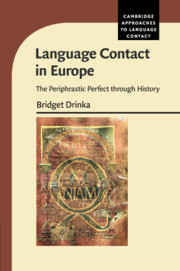Book contents
- Frontmatter
- Contents
- Series Editor's Foreword
- Acknowledgments
- Abbreviations, Based on the Leipzig Glossing Rules
- 1 Language Contact in Europe: The Periphrastic Perfect through History
- 2 Languages in Contact, Areal Linguistics, and the Perfect
- 3 The Perfect as a Category
- 4 Sources of the Perfect in Indo- European
- 5 The Periphrastic Perfect in Greek
- 6 The Periphrastic Perfect in Latin
- 7 The Charlemagne Sprachbund and the Periphrastic Perfects
- 8 The Core and Peripheral Features of the Romance Languages
- 9 The Early Development of the Perfect in the Germanic Languages
- 10 The Semantic Shift of Anterior to Preterite
- 11 The Balkan Perfects: Grammaticalization and Contact
- 12 Byzantium, Orthodoxy, and Old Church Slavonic
- 13 The l- perfect in North Slavic
- 14 Updating the Notion of Sprachbund: New Resultatives and the Circum- Baltic “Stratifi ed Convergence Zone”
- 15 The have Resultative in North Slavic and Baltic
- 16 Conclusions
- Notes
- Bibliography
- Index
13 - The l- perfect in North Slavic
Published online by Cambridge University Press: 23 February 2017
- Frontmatter
- Contents
- Series Editor's Foreword
- Acknowledgments
- Abbreviations, Based on the Leipzig Glossing Rules
- 1 Language Contact in Europe: The Periphrastic Perfect through History
- 2 Languages in Contact, Areal Linguistics, and the Perfect
- 3 The Perfect as a Category
- 4 Sources of the Perfect in Indo- European
- 5 The Periphrastic Perfect in Greek
- 6 The Periphrastic Perfect in Latin
- 7 The Charlemagne Sprachbund and the Periphrastic Perfects
- 8 The Core and Peripheral Features of the Romance Languages
- 9 The Early Development of the Perfect in the Germanic Languages
- 10 The Semantic Shift of Anterior to Preterite
- 11 The Balkan Perfects: Grammaticalization and Contact
- 12 Byzantium, Orthodoxy, and Old Church Slavonic
- 13 The l- perfect in North Slavic
- 14 Updating the Notion of Sprachbund: New Resultatives and the Circum- Baltic “Stratifi ed Convergence Zone”
- 15 The have Resultative in North Slavic and Baltic
- 16 Conclusions
- Notes
- Bibliography
- Index
Summary
Introduction
In the present chapter, we turn to Maslov's Stage 2, the development of the l-perfect across the N. Slavic languages. After a discussion of the replacement of the old aspect tenses by l-perfects in N. Slavic, we focus on geographical factors and examine the documentary evidence. An examination of the role of sociolinguistic factors in the development of the l-perfects east and west and the impact of this distribution on the expansion of aspectual contrast concludes this chapter.
Replacement of Aspect Tenses by l-perfect in North Slavic
In Chapter 11, we noted the general tendency toward loss of the imperfect and aorist categories in S. Slavic, especially in those varieties at a greater distance from Greek. This trend is likewise to be noted in the N. Slavic languages: most varieties lose the imperfect first, followed by the aorist, replacing them with the l-perfect, which becomes the only marker of the past. Those languages with more conservative traditions, such as Czech, tend to maintain the aspect tenses longer; those with more innovative tendencies, such as the northern Russian dialects around Novgorod and Pskov, lose the imperfect and aorist very early: there is, for example, practically no evidence for either of these categories in the vernacular birchbark letters of Novgorod. The imperfects and aorists survive in Old Church Slavonic and in medieval Russian and Croatian Church Slavonic, and, as we have seen, in the modern S. Slavic languages of Bulgarian, Macedonian, and Serbian. The aorists and imperfects are already almost extinct in the earliest documents of Old Polish and Old Czech (Andersen 2009: 127). These facts are summarized in Table 13.1.
We can note two conservatizing forces at work in Slavic, which hindered the process of replacement:
1) the archaizing pressures of Church Slavonic, and, ultimately, Byzantine Greek, which affected the S. Slavic languages most thoroughly, but which had an ongoing resurgent effect in all areas under the influence of Orthodoxy (Chapter 12)
2) the retention and revamping of old categories for stylistic purposes (Czech) or in imitation of external models (Sorbian), which Dickey (2011: 201) calls “replica preservation” (Section 13.6)
- Type
- Chapter
- Information
- Language Contact in EuropeThe Periphrastic Perfect through History, pp. 314 - 340Publisher: Cambridge University PressPrint publication year: 2017



